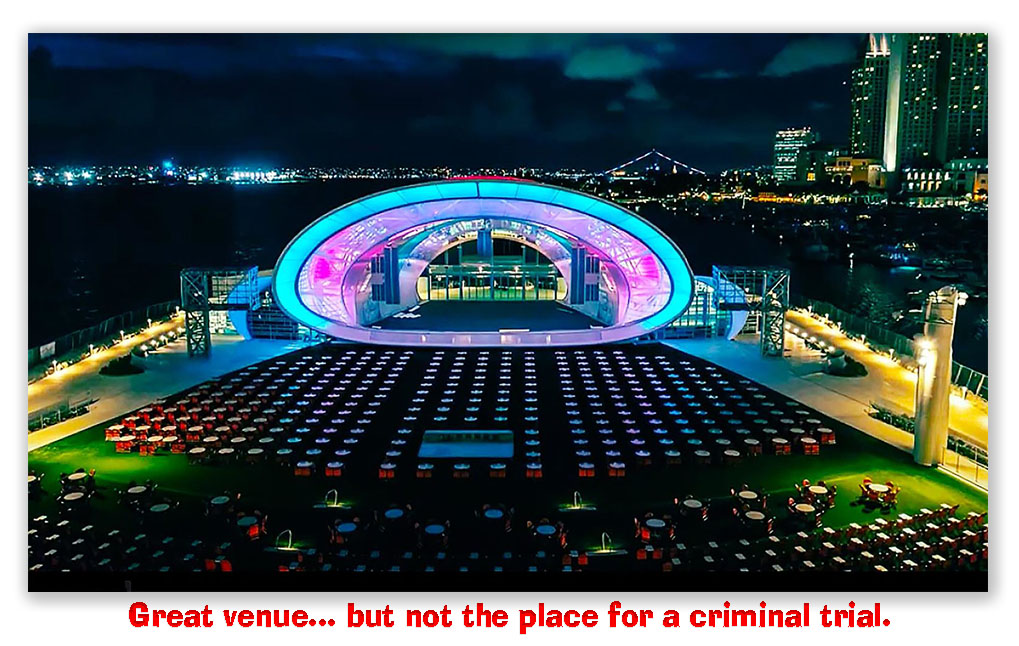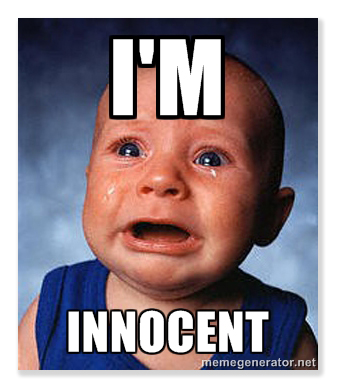We post news and comment on federal criminal justice issues, focused primarily on trial and post-conviction matters, legislative initiatives, and sentencing issues.

NOW IT’S TIME FOR DOUBLE JEOPARDY…
 Tim Smith was a hacker, code cracker, slacker... When he wasn’t hanging out with all the chatroom yakkers, the southern Alabama man liked to fish and dive in the Gulf of Mexico.
Tim Smith was a hacker, code cracker, slacker... When he wasn’t hanging out with all the chatroom yakkers, the southern Alabama man liked to fish and dive in the Gulf of Mexico.
Blending his computer savvy with his angler hobby, Tim was able to hack the geographic coordinates of artificial reefs in the Gulf of Mexico from StrikeLines, an Orlando, Florida, company that sold the data to people looking for the best places to fish. Tim – who thought that StrikeLines was morally wrong to capitalize on the work of the people who built the reefs by selling their locations – made the stolen data freely available on the Internet and offered to help StrikeLines patch its website vulnerability in exchange for some data he had been unable to extract from the site about a few great deep locations for catching grouper.
Or so the Northern District of Florida jury found, holding that Tim was guilty of violating the Computer Fraud and Abuse Act, 18 USC § 1030(a)(2)(C) and (c)(2)(B)(iii), for intentionally accessing a computer without authorization; for theft of trade secrets in violation of 18 USC § 1832(a)(1), and for transmitting a threat through interstate commerce with intent to extort a thing of value in violation of 18 USC § 875(d). The judge gave him 18 months.
 But Tim fought back. Before trial, he argued the indictment had to be dismissed for lack of venue, citing the Constitution’s Venue Clause (Article III, § 2, clause 3), and the 6th Amendment’s Vicinage Clause. He argued that his trial in the Northern District of Florida was improper because he had accessed StrikeLines’ website from his home in the Southern District of Alabama and the servers storing StrikeLines’ data were located in the Middle District of Florida.
But Tim fought back. Before trial, he argued the indictment had to be dismissed for lack of venue, citing the Constitution’s Venue Clause (Article III, § 2, clause 3), and the 6th Amendment’s Vicinage Clause. He argued that his trial in the Northern District of Florida was improper because he had accessed StrikeLines’ website from his home in the Southern District of Alabama and the servers storing StrikeLines’ data were located in the Middle District of Florida.
The judge kicked the venue question to the jury, which found that because the effects of Tim’s crime were felt at StrikeLines’ headquarters in the Northern District of Florida, venue was proper. On appeal, the 11th Circuit disagreed, holding that venue in the Northern District of Florida was improper.
But Tim’s victory was short-lived because the Circuit said Tim could be re-prosecuted in the right venue.
Tim took that issue to the Supreme Court, which yesterday agreed in a unanimous opinion that even when a venue issue is decided incorrectly by the jury, that fact does not implicate double jeopardy. Justice Samuel Alito’s opinion observed that the usual remedy for error was a new trial rather than complete dismissal of the case. The only exception the court had recognized to that rule, Alito noted, was the violation of the right to a speedy trial, which SCOTUSBlog said the court previously has categorized as “‘generically different,’ presumably because a delayed trial is hardly remedied by one still further delayed.”
Venue in a criminal trial is a procedural issue with a constitutional dimension. The Venue Clause is keyed to the location of the alleged crime, not the district where the accused resides or even the district in which he or she is located at the time of committing the crime. Thus, as the Supreme Court puts it, “the Clause does not allow variation for convenience of the accused.”
The Vicinage Clause guarantees the right to an impartial jury made up of people from the state and district “wherein the crime shall have been committed.” The Vicinage Clause “reinforces” the coverage of the Venue Clause because, in protecting the right to a jury drawn from the place where a crime occurred, it essentially mandates where a trial must be held.
The Supreme Court said a judicial decision on venue is “fundamentally different” from a jury’s general verdict of acquittal. When a jury returns a general verdict of not guilty, its decision cannot be upset by judicial speculation or inquiry into why the jury did what it did. “To conclude otherwise,” the Court said, “would impermissibly authorize judges to usurp the jury right.” Because a trial court cannot be certain about a jury’s basis for a ‘not guilty’ verdict without improperly delving into the jurors’ deliberations, “the jury holds an unreviewable power to return a verdict of not guilty even for impermissible reasons.”
 A defendant’s culpability is the touchstone for determining whether retrial is permitted under the 5th Amendment’s Double Jeopardy Clause. When a trial ends with a finding that the defendant’s criminal culpability had not been established, retrial is prohibited. Conversely, “retrial is permissible when a trial terminates on a basis unrelated to factual guilt or innocence of the offense of which the defendant is accused.” For example, the Double Jeopardy Clause is not triggered when a trial ends in juror deadlock, or with a judgment dismissing charges because of a procedural issue like preindictment delay. “In these circumstances,” the Court held, “the termination of proceedings is perfectly consistent with the possibility that the defendant is guilty of the charged offense.
A defendant’s culpability is the touchstone for determining whether retrial is permitted under the 5th Amendment’s Double Jeopardy Clause. When a trial ends with a finding that the defendant’s criminal culpability had not been established, retrial is prohibited. Conversely, “retrial is permissible when a trial terminates on a basis unrelated to factual guilt or innocence of the offense of which the defendant is accused.” For example, the Double Jeopardy Clause is not triggered when a trial ends in juror deadlock, or with a judgment dismissing charges because of a procedural issue like preindictment delay. “In these circumstances,” the Court held, “the termination of proceedings is perfectly consistent with the possibility that the defendant is guilty of the charged offense.
The vicinage right is only one aspect of the jury-trial rights protected by the 6th Amendment, the Court said. Retrials are the appropriate remedy for violations of other jury-trial rights. “The reversal of a conviction based on a violation of the Venue or Vicinage Clauses, even when styled as a ‘judgment of acquittal’ under Rule 29, plainly does not resolve ‘the bottom-line question of ‘criminal culpability’,” the Court said. “In this case, then, the 11th Circuit’s decision that venue in the Northern District of Florida was improper did not adjudicate Smith’s culpability… [and] thus does not trigger the Double Jeopardy Clause.”
Smith v. United States, Case No. 21-1576, 2023 U.S. LEXIS 2546, at *24-25 (June 15, 2023)
SCOTUSBlog.com, Unanimous court holds that the remedy for a venue error is retrial (June 15, 2023)
– Thomas L. Root

